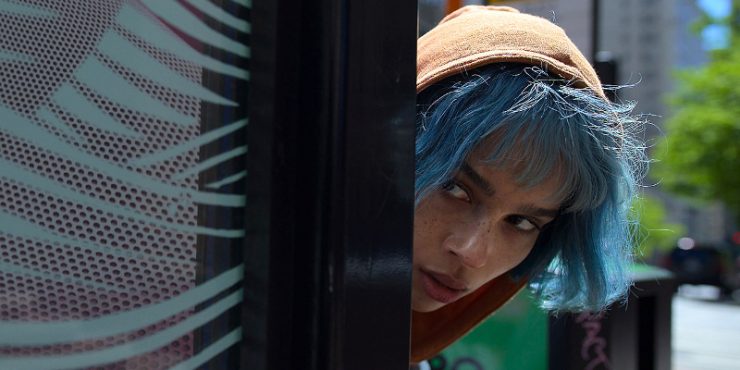The “COVID movie” is a still a bit of a gamble. The years-long pandemic which has caused (and continues to cause) mass death and sidelined “regular life” (whatever that means) is both a controversial topic done in by tribalist forces, but also, more directly, not something people are interested in experiencing in their fiction. At least that’s what a majority of people think and say. I’d imagine if an author or filmmaker is skilled enough, this period of time can be evoked properly as something compelling or dramatic. I’m not sure if Kimi is that movie, but it does make a triumphant effort. The latest film from maestro Steven Soderbergh – and written by veteran screenwriter David Koepp – takes place in the pandemic world, but that’s not the only bogeyman from 2022 that makes an appearance.
The “Kimi” from the title is a virtual assistant (a la Siri or Alexa) from a major tech corporation that sits in the corner of your room and completes simple tasks like turning on and off lights or turning on and off music (a lot of turning on and off) with the voice command of whoever owns it. The film opens with a boxy, suited man (Derek DelGaudio) filming a zoom interview for television about how Kimi sets itself apart from the rest of the competition through the competence of “their people”. One of those people is Angela Childs (a blue-haired Zoe Kravitz), a Seattle-based quality control associate who listens to anonymous (they’re not taking your information! it’s anonymous!) data streams of Kimi’s limitations with customers and tries to improve its comprehension.
Angela also has crippling agoraphobia. The affliction began after a trauma in her past, but minor progress was completely waylaid after the pandemic locked everything down. She has the benefit of working remote from home, which allows her to live her life without ever having to leave her loft apartment. All her groceries and medications (and hair dye, presumably) get delivered, and her one consistent visitor – a neighbor from across the street named Terry (Byron Bowers) – comes over for sex but once they’re finished, she’s very eager for him to leave. Despite the protestations of her mother, her therapist and even a dentist who thinks Angela may need to have an emergency root canal, Angela refuses to leave her apartment. That is until she hears a troubling sound over one of the data streams, and becomes convinced a violent crime has been committed.
As Angela searches deeper, she tries to alert security forces within her company, but it becomes clear quickly that there is no interest in uncovering wrongdoing, and that perhaps the perpetrator might be one of their own. What follows has a little bit of Rear Window, a little bit of The Conversation, and even has room for a sequence that can only be described as “R-rated Home Alone“. The references are worn without shame, as they should be, and really stress what makes a movie like Kimi so fun: despite the zaniness within the story, the script is so grounded that suspension of disbelief is rather easy. Koepp (Jurassic Park, the 1996 Mission: Impossible) is a rather ingenious storyteller with a sixth sense for how to keep audiences entertained and a preternatural skill for finding the human center of some rather outlandish narrative arcs. What his scripts lack in supposed sophistication, they more than make up for in stirring amusement.
This is director Steven Soderbergh’s fifth consecutive straight-to-streaming release. He was an early adopter of the trend and seems to have found comfort here within his torrid, on-again/off-again relationship with Hollywood. His career has always been more experimental than his reputation of prestige would lead you to believe, and his last few films have seemed to have an active disregard for the mainstream. Truth be told, he has appeared more interested lately in his own array of digital filmmaking techniques (or in the case of last year’s fantastic No Sudden Move, jarring fish eye lenses) than telling a structured story. The result is a mixed bag of films that can feel quite tossed off, but last year’s No Sudden Move and now Kimi show that Soderbergh still has an eye for good scripts, and is willing to craft compelling drama with an intentionally limited set of resources.
Kravitz’s nervy Angela is another one of the actress’s idiosyncratic creations, a performer destined to play outside the confinements that her genetically-certified beauty may present. That she can still have assured sex appeal while staying true to the unsteady Angela is further proof of her ability to lead a movie. She’s as committed to Kimi‘s dramatic moments as she is to the film’s unprompted zany bits. That these contrasts work so well is a testament to the strength of Koepp’s script and Soderbergh’s steady direction, but also to Kravitz’s ability to play whatever is asked of her and keep it centered in the character as written. There are parts of Kimi that could become dated quickly, but its central premise (everywoman in over her head, overcoming fears to take on a monolithic adversary) is a universally beloved one, and one hard to do incorrectly. While it may not rank among Soderbergh’s heights of Traffic or Ocean’s Eleven, it’s a small budget film propelled by uber competence behind the camera and natural charm in front of it. This kind of film is feeling rarer these days.
Directed by Steven Soderbergh










